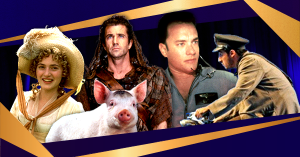Kenneth Branagh’s Best Films As a Director
In this week's Total Recall, we count down the best-reviewed work of the Jack Ryan: Shadow Recruit director.
Long before Joss Whedon balanced big-budget Marvel epics with arthouse Shakespearean adaptations, Kenneth Branagh got there first — and this weekend, he serves up another popcorn action thriller with Jack Ryan: Shadow Recruit, which reboots the Jack Ryan franchise with Chris Pine in the lead (and Branagh co-starring in a pivotal role). In honor of Mr. Branagh’s latest directorial effort, we decided to dedicate this week’s list to a fond look back at some of his more successful features. Yes, there’s plenty of Shakespeare here, but you may not remember just how diverse he’s been — and that’s a big part of why we’re here. It’s time for Total Recall!
10. Mary Shelley’s Frankenstein
After Henry V, Dead Again, Peter’s Friends, and Much Ado About Nothing, Branagh was on a pretty good roll as a director; on paper, turning him loose on Mary Shelley’s Frankenstein seemed like a can’t-miss proposition, especially with none other than Robert De Niro on board to play the monster. But while Branagh’s passionately faithful take on the oft-adapted tale eventually recouped its $45 million budget, it was still regarded as a perplexing misfire in an exciting young career. “Mr. Branagh is in over his head,” wrote a disappointed Janet Maslin for the New York Times. “He displays neither the technical finesse to handle a big, visually ambitious film nor the insight to develop a stirring new version of this story.”
9. Love’s Labour’s Lost
There’s an element of confident playfulness in all of Branagh’s Shakespeare adaptations, but with 2000’s Love’s Labour’s Lost, he really got wacky, recasting the classic play as a song-and-dance number featuring American Songbook standards like “They Can’t Take That Away from Me” and “The Way You Look Tonight.” It wasn’t exactly the most natural-seeming blend, particularly with a cast that included Alicia Silverstone and Matthew Lillard, and a number of critics responded with pained bewilderment. For others, however, it offered further proof of Branagh’s way with Shakespeare. “The Bard of Stratford’s saga of the four students who swear off women only to have a ton of trouble keeping their promise is dense with dialogue,” wrote Boxoffice’s Mike Kerrigan. “But Branagh axes about two thirds of that — and replaces it with songs by Cole Porter, Irving Berlin, the Gershwins and Jerome Kern. And it’s wonderfully, wildly, winningly entertaining.”
8. The Magic Flute
Many of Kenneth Branagh’s greatest career achievements have come from embracing the unlikely or unexpected, and 2006’s The Magic Flute is a case in point. How many filmmakers would think to take a Mozart opera and move its setting to the trenches of World War I — and produce a sweet G-rated romance in the bargain? And while its antiquated source material and protracted running time conspired to keep The Magic Flute away from the top of the box office charts, Branagh’s production — timed to celebrate the 250th anniversary of Mozart’s birth — managed to blend its disparate elements just often enough to win over a majority of critics. As Stephanie Zacharek put it for Salon, “Even though there were moments in The Magic Flute when I wondered if Branagh hadn’t truly gone off his rocker, I found its audacity exhilarating.”
7. Peter’s Friends
Basically a British spin on The Big Chill, only with 1980s nostalgia swapped in for that film’s bittersweet look back at the 1960s, Peter’s Friends found Branagh putting a contemporary slant on the type of ensemble dramedy he’d already proven he could do well with his Shakespeare adaptations. Once again, he reined in a talented and interestingly varied cast, including Stephen Fry, Imelda Staunton, Emma Thompson, and Hugh Laurie, and their almost uniformly sharp grasp of the screenplay’s timelessly resonant themes helped add heft to what might have been an unremarkably derivative film in less accomplished hands. “If the dialogue is witty, if the characters are convincingly funny or sad, if there is the right bittersweet nostalgia and the sense that someone is likely to burst into ‘Those Were the Days,’ then it doesn’t matter that we’ve seen the formula before,” argued Roger Ebert. “This is a new weekend with new friends.”
6. Thor
If you’re going to try making a movie about a superhero who often speaks as though he’s a character in a Shakespeare play, you want a director who knows the territory. Of course, Kenneth Branagh had a lot more going for him as the director of Thor than simply a familiarity with iambic pentameter; although he might have seemed a somewhat curious choice for the gig, as the end result demonstrated, his gift for light comedy and sweeping romance helped lend some sweet overtones to what might otherwise have been just another costumed action thriller. As Lisa Kennedy put it for the Denver Post, “[Branagh’s] Shakespearean chops add texture in scenes that require the care and feeding of literature’s grander themes: pride, paternity and honor.”
5. In the Bleak Midwinter (A Midwinter’s Tale)
After adapting Shakespeare for 1989’s Henry V and 1993’s Much Ado About Nothing, Branagh mixed things up a bit: instead of simply bringing Shakespeare to the screen, 1995’s In the Bleak Midwinter (A Midwinter’s Tale) was about an actor (played by Michael Maloney, serving as a Woody Allen-style Branagh proxy) haplessly trying to mount a production of Hamlet. A meta-laced warmup of sorts for Branagh’s own Hamlet, which would see release the following year, Midwinter offered film fans a funny (albeit admittedly uneven) appetizer that combined old-fashioned comedy and classic prose with a charmingly low-budget visual aesthetic. “There are so many laughs here, so much theatrical temperament on display, that you can’t help but embrace the picture, even with its obvious flaws,” argued Hal Hinson for the Washington Post.
4. Dead Again
An ambitious blend of romantic melodrama and neo-noir with supernatural overtones, Dead Again asked a lot of Branagh — he and co-star Emma Thompson played dual roles, while Branagh the director had to make sure he gave the audience enough visual cues to untangle the fairly complex story of a detective who stumbles across a mute amnesia victim who may or may not have been his wife in a past life. The end result could easily have spiraled into soggy schmaltz or mystical mumbo-jumbo, but Dead Again ultimately kept enough of its plates spinning to draw impressive praise from the majority of critics — including Jonathan Rosenbaum of the Chicago Reader, who wrote, “As the twists come thick and fast and the plot gets progressively more and more baroque, Branagh shows himself to be at least as intelligent as Brian De Palma in delivering over-the-top stylistic filigree.”
3. Much Ado About Nothing
Four years after making his directorial debut with Henry V, Branagh returned to the director’s chair for another Shakespeare adaptation: Much Ado About Nothing, an infectiously fleet-footed comedy about star-crossed lovers and royal deceit that, as tends to be his wont, Branagh stuffed with an impressively eclectic roster of stars. On paper, it might have seemed borderline goofy to put Keanu Reeves, Michael Keaton, and Denzel Washington together in a film adaptation of a Shakespeare play, but with Much Ado, Branagh made it work. And while the marquee-friendly cast might have made Shakespeare seem a little sexier to younger filmgoers, Branagh backed up all that glitz with a smart, finely crafted take on the play; as Owen Gleiberman wrote for Entertainment Weekly, the director’s “true achievement” with the movie was that he “found his way to the play’s profound yet populist heart, rediscovering Shakespeare’s vision of romantic fulfillment – celebration with an underlying tug of sadness – for an era that believes itself all too wise to the ways of love.”
2. Hamlet
Try adapting Hamlet for the screen after all these years, and you’d better bring something special to the table — and to his credit, that’s exactly what writer/director/star Kenneth Branagh did with his 1996 take on the classic Shakespeare play, leaving no dramatic stone unturned in a sprawling four-hour epic boasting the acting talents of an equally hefty ensemble cast that included Kate Winslet, Jack Lemmon, Robin Williams, Billy Crystal, Richard Attenborough, Judi Dench, Charlton Heston…you get the idea. Although they’d seen it adapted countless times before, critics couldn’t help but be impressed by Branagh’s Hamlet; as James Berardinelli wrote for ReelViews, “I have seen dozens of versions of this play (either on screen or on stage), and none has ever held me in such a grip of awe.”
1. Henry V
Want to star in a production of Shakespeare’s Henry V? You can always take a page from Kenneth Branagh’s book and take the director’s gig, then cast yourself in the title role. Thankfully, there’s a lot more than ego at play in Branagh’s Henry V, which found him making his directorial debut while surrounding himself with an impeccable cast that included Emma Thompson, Judi Dench, Ian Holm, and Robbie Coltrane. In fact, while a decently mounted Shakespeare adaptation is always a pretty safe ticket to the Fresh side of the Tomatometer, critics were unanimous in their praise for Branagh’s Bard; as Hal Hinson breathlessly enthused for the Washington Post, “Everything about this remarkable production is exhilaratingly unexpected.”
In case you were wondering, here are Branagh’s top 10 movies according RT users’ scores:
1. Henry V — 90%
2. Hamlet — 90%
3. In the Bleak Midwinter (A Midwinter’s Tale) — 89%
4. Much Ado About Nothing — 87%
5. Dead Again — 78%
6. Peter’s Friends — 78%
7. Thor — 76%
8. The Magic Flute — 66%
9. Sleuth — 52%
10. Mary Shelley’s Frankenstein — 50%
Take a look through Branagh’s complete filmography, as well as the rest of our Total Recall archives. And don’t forget to check out the reviews for Jack Ryan: Shadow Recruit.
Finally, here’s the trailer for Branagh’s BBC detective series series Wallander:





